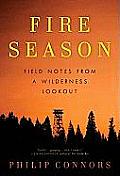
People often ask me why I so love being a fire lookout. Why do I keep returning, year after year, for nearly a decade now? The fact is, it would take me hours to truly explain; I wrote a 250-page book about the job and the landscape, after all. It's not merely about the seductions of solitude, though that is part of it — the opportunity to escape for a while the messy transactions of social life, with their occasions for guilt and regret, their endless opportunities for failure. It's also about connecting with forces larger than the human world — the life cycles of insects, the migratory patterns of birds, the track of the Milky Way across the sky, the ancient music of creek water, all that was here before us and all that will remain after, if we and our beleaguered planet are lucky.
We all have the capacity to be moved by these things. So why are some of us drawn to them with greater zeal? I've mulled this question for a long time now, and if you study the four titans of American conservation from around a century ago, people who loved being outdoors, you see, perhaps, the beginnings of an answer. John Muir was temporarily blinded by a metal shaving when he was a young man. The experience forever changed him. It's part of what sent him on long rambles across the country, sleeping outdoors for weeks and months at a stretch, seeing up close the tremendous beauty and diversity of life in America, an experience recounted in his book A Thousand Mile Walk to the Gulf. President Teddy Roosevelt's mother and wife died on the same day when he was a young man; this double-barreled blow changed him forever, too. He pieced himself together, in part, on his ranch in the Dakota Badlands, and later he would become a champion of public-lands preservation, creating tens of millions of acres of protected parks and forests.
Roosevelt's right-hand man in conservation matters, Gifford Pinchot, who basically founded the Forest Service, lost the love of his life at the age of 26 and spent the next four decades trying to commune with her ghost. He was the ultimate patrician, the son of a wealthy timber baron, but he craved time alone in the woods for the peace it brought his tumultuous soul. And Aldo Leopold, considered by many to be the father of the modern environmental movement, was struck by a kidney ailment on a long horseback trip in northern New Mexico when he was in his 20s. He almost died; it took him years to recover fully. Afterward, his feel for the nuances of ecology was keener, his sense of the interconnectedness of all natural things was sharper.
It's my hunch that there's a meaningful pattern here just waiting for some ambitious graduate student to tease it out in a monograph, probably with the addition of other examples. Maybe someone already has.
In my case, the terrorist attacks of September 11 — the awful destruction of which I witnessed up close in Lower Manhattan — and our country's insane response to it are not unrelated to my desire for a solitary experience in the outdoor world. Even more to the point is my brother's tragic suicide at the age of 21, an act that left me confused and bereft for years as I grappled with the awful finality of that gunshot. The things people do to each other, the things people do to themselves: if you've never felt a twinge of misanthropy, you're probably not paying attention.
The best cure for that misanthropy, I've found, is a long stretch of time alone in the beauty of the world as we were given it. Some people find adequate solitude in a couple of hours in the garden on a Sunday afternoon; I happen to need about a hundred days a year on a mountain in the wilderness. But I say: to each her own. I don't want to become a raving crank or a preacher of doom. I need time away from human society in order to learn to love it again. In this, I feel certain, I am far from alone.